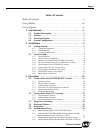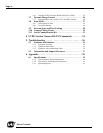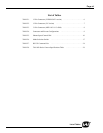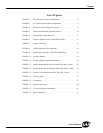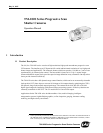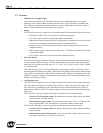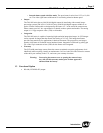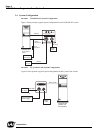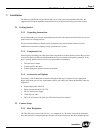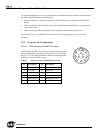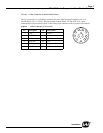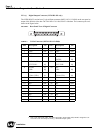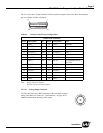
Page 2
TM-1020 Series Progressive Scan Shutter Cameras
Introduction
1.2 Features
• Miniature size and light weight
The printed circuit boards in the TM-1020 series have been arranged based on a new design
philosophy. This creates modular electronics for the camera, giving it flexibility. In addition, the
use of miniature solid-state components results in a compact, lightweight camera that is 44mm x
44mm x 64mm in dimensions, and weighs only 149 grams.
• Imager
The TM-1020 series uses a progressive-scan interline transfer CCD that has the following features:
- Resolution of 1008 x 1018 active pixels for excellent image quality.
- 9.0 x 9.0 µm square pixels for precise dimensional measurement.
- High-speed electronic shutter capability for high dynamic resolution of moving objects and
electronic iris control that eliminates the need for a mechanical shutter.
- Progressive-scan CCD eliminates interlace deterioration of image and increases ease of
computer interface.
- High sensitivity and low noise at fast scanning. The 1” CCD has an excellent S/N ratio that
is greater than 50dB.
- The CCD has a built-in microlens for increased quantum efficiency.
• Electronic shutter
The TM-1020 series has a substrate drain-type shutter mechanism which provides superb pictures
at various speeds without smearing. A built-in manual shutter speed control selects the electronic
shutter rate of 1/60 (non-async mode only), 1/125, 1/250, 1/500, 1/1,000, 1/2,000, 1/4,000, 1/8,000,
or 1/16,000 second.
With VINIT high (5V), the CCD keeps discharging. With a negative pulse to VINIT, the camera
resets and purges the charge momentarily. Then it starts integrating for the period of shutter control
set by either an external pulse width or internal shutter control. Progressive scanning permits a full
1000 lines of vertical resolution, as compared to a conventional CCD camera which captures only
half the vertical lines per shutter.
• Asynchronous reset
The TM-1020 series captures async reset images and provides single-shot video output with single
FDV. This makes it simpler for an ordinary frame grabber to capture the async reset images. The
TM-1020 series’s asynchronous reset is flexible and accepts external horizontal drive (HD) for
phase locking. When the VINIT (5V) pulse is applied, it resets the camera's scanning and purging
of the CCD.
The TM-1020A-15 has two modes to control the asynchronous reset and shutter speed:
- External VINIT with pulse width. The duration between pulse edges controls the shutter
speed externally (No-delay shutter).
- Internal shutter speed control. The speed control varies from 1/125 to 1/16,000 sec. The
video signal and FDV starts with internal V reset timing related to shutter speed.
The TM-1020-15 has three modes to control the asynchronous reset and shutter speed:
- External VINIT with pulse width. The duration between pulse edges controls the shutter
speed externally.
- Internal shutter speed with Fast mode. The video signal has no delay from the reset tim-
ing. (shutter speed range is 1/2,000 to 1/16,000 sec.)




